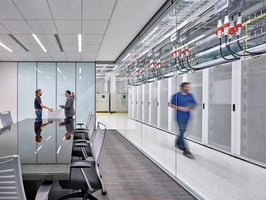The 2025 Data Center Space Shortage: What’s Driving It? If you’re searching for data center space...
AI Boom Triggers Surging Demand for Data Center Space
AI’s Insatiable Appetite for Data Center Capacity
At Arkitech Group, we talk a lot about AI and for good reason. The explosion of artificial intelligence (AI) applications – from machine learning to generative AI – is creating massive demand for data center space like never before. Recent advances in AI require enormous computing power and storage, which in turn means more servers, GPUs, and infrastructure housed in data centers. As organizations race to deploy AI-driven services, they are finding that traditional data centers are hitting capacity limits (Source)..
Unlike standard business software, cutting-edge AI workloads are GPU-intensive and high-density, drawing significantly more power and generating more heat. Existing facilities can’t always handle these requirements, so companies are urgently seeking additional data center space to house specialized AI hardware. The result is a data center space crunch in many regions: demand is outpacing the supply of rack space and power availability. If you’re searching for colocation or cloud capacity in major markets, you may find long wait lists or premium prices – a clear sign of how the AI boom is straining the system.
Record-Breaking Demand from Hyperscalers and Businesses
Major cloud providers and hyperscalers (like Microsoft, Amazon, and Google) are among the biggest drivers of this surge. They are rapidly building out infrastructure to support AI services and, in many cases, snapping up entire data centers’ worth of capacity before it even hits the market. For example, Microsoft has invested heavily to support its AI initiatives (such as OpenAI’s ChatGPT and its own Azure AI services). Microsoft’s President, Brad Smith, revealed that the company plans to spend approximately $80 billion in FY2025 to build out AI-enabled data centers for training and deploying AI models – a huge increase from the prior year. More than half of that investment will be in the U.S., reflecting the fierce race to build AI infrastructure (Source)..
Leading data center providers are feeling the rush as well. Digital Realty, one of the world’s largest data center firms, had a “breakout year” in 2024 thanks to soaring AI demand. According to CEO Andrew Power, about 30% of the megawatts Digital Realty signed in a recent quarter were related to AI workloads (Source).. In other words, nearly one-third of new data center power capacity is being gobbled up for AI processing needs. This trend underscores how AI has swiftly moved from a niche workload to a core driver of data center growth.
Similarly, Equinix, the global colocation and interconnection provider, is reporting unprecedented interest in its facilities due to AI. Equinix has been expanding its xScale data centers (built for hyperscale cloud and AI deployments) to meet customer demand. Reports indicate Equinix leased significant megawatts of capacity to hyperscalers in late 2024, accelerating its investment plans to keep up. While exact figures vary, the clear message is that Equinix and others are scaling up construction pipelines drastically to avoid missing out on the AI wave (Source).
This surge isn’t just from tech giants. Regular enterprises across finance, healthcare, manufacturing, and more are also implementing AI for analytics, automation, and decision-making. They too require robust infrastructure, whether in public cloud or in colocation facilities, contributing to the crunch. According to industry observers, data center availability has tightened globally – especially in key hubs like Northern Virginia (the world’s largest data center market), Silicon Valley, London, and Singapore. Power constraints in some areas (for example, power grid limits in parts of Virginia and Dublin) further restrict how quickly new capacity can come online(Source)..
The Response: Providers Race to Add Space
To tackle the skyrocketing demand, data center operators and cloud providers are in an all-out building spree (and creative planning mode) to expand capacity:
-
Building New Data Centers at Record Pace: Companies are investing billions to construct new facilities. Digital Realty, for instance, is expanding across 25+ countries and had 9.1 million square feet under construction as of late 2024. It has secured land for nearly 4 gigawatts of additional capacity – a forward-looking move anticipating the continued growth of AI and cloud (Source). Equinix has announced plans to open multiple large campuses and joint ventures globally to host hyperscale infrastructure. These projects are aiming to deliver more rack space and megawatts as fast as possible (Source).
-
Innovating with Higher-Density Designs: Because AI hardware demands so much power and cooling, data centers are redesigning for high density. This includes adopting advanced cooling techniques like liquid immersion cooling and direct-to-chip cooling to support densely packed GPU servers (Source).. By efficiently cooling these hotter racks, providers can stack more computing power into the same square footage. This maximizes existing space and is especially critical for AI, where a single rack might hold thousands of AI accelerator chips. Companies are also upgrading power distribution and backup systems to handle the huge power draws of AI equipment.
-
Strategic Placement for Power Availability: Operators are choosing sites in locations with robust power and opportunities for expansion. Building near renewable energy sources has become a trend – for example, data center firms (and cloud giants like Google) are locating new facilities adjacent to solar or wind farms to secure plentiful, sustainable power for AI clusters. This not only helps meet the power needs but also aligns with corporate sustainability goals given AI’s large energy footprint. In some cutting-edge cases, providers are even exploring small-scale nuclear reactors as a future power source for data centers– a testament to how critical power is in this equation.
-
Modular and Rapid Deployment: To shorten construction timeframes, many are using modular data center designs. Modular or prefabricated data centers can be assembled much faster than traditional builds – sometimes in just 6–12 months. They allow providers to add capacity in incremental blocks. For example, if a region suddenly needs more AI computing, an operator can deploy a modular unit on available land to quickly provide extra racks. This agility is helping close the gap between demand and supply in the near term.
Even with these efforts, experts caution that building new capacity takes time. A data center can take 1–2 years (or more) from planning to opening. Meanwhile, demand for AI compute keeps growing rapidly. Industry projections suggest that AI data center demand will rise at over 30% per year for the remainder of the decade, underlining just how fast providers need to move.
What It Means for Businesses and IT Teams
Securing infrastructure for AI projects is getting harder. Space in top-tier data centers is more expensive and harder to find, with long lead times becoming the norm. In some cases, companies must consider secondary markets as major hubs are full.
Given the surge in AI demand, careful planning is essential:
-
Plan early. Start your search and negotiations well in advance to lock in space before it becomes scarce or costly.
-
Consider all options. Stay flexible by exploring cloud services, edge data centers, and hybrid solutions to bypass local capacity crunches.
-
Partner smartly. Work with experts who have real-time market insights. At Arkitech Group, through partnerships like Bridgepointe, we help clients access capacity and deals that are not always publicly visible.
Despite the squeeze, new data center capacity is coming online, but staying ahead requires strategy and speed.
If you need help planning, sourcing, or managing your AI infrastructure needs, reach out to Arkitech Group. Our experts can help you find the space and solutions you need before the market catches up. Contact us today at info@arkitechgroup.com for a consultation today!





